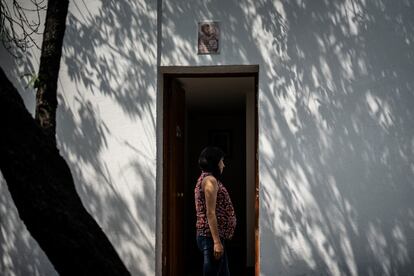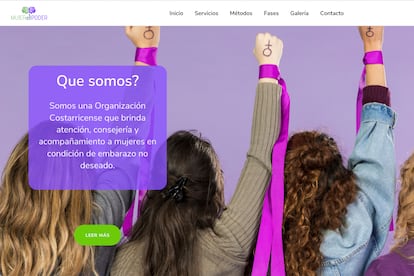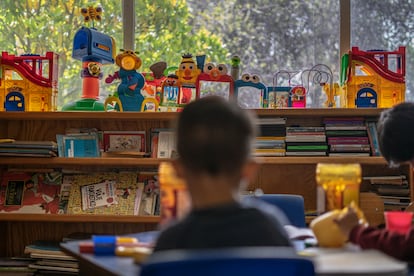The new anti-abortion tactics of the far right in the Americas
Centers affiliated with the ultraconservative US organization Heartbeat International use misleading advertising, shelters and false promises of adoption to prevent vulnerable women from having an abortion in Latin America, an investigation by EL PAÍS reveals
The new anti-abortion tactics of the far right in the Americas
An EL PAÍS investigation in five Latin American countries has found that a network of centers affiliated with the far-right US organization Heartbeat International (HI) promote themselves online as feminist support groups and use misleading language in favor of abortion, but in reality they work to manipulate and institutionalize women to get them to carry their pregnancy to term. Five female reporters and one male reporter went undercover to centers in Argentina, Colombia, Costa Rica, El Salvador and Mexico between 2019 and 2021, as a follow-up to an OpenDemocracy investigation into HI’s operations in the region.
During those visits, they found that these centers operate in very similar ways: they offer false information about abortion, propose adoption as an alternative and, in some cases, they temporarily offer accommodation and food. Their promises to help find a home for their child are often against the law in the countries where they operate. Their strategy is part of the new onslaught of the ultraconservative movement that works in the region to stop the advancement of women’s reproductive rights.

In three of the five countries included in this report, the portals use misleading advertising or identify themselves as feminist activists. In Mexico, Colombia and Costa Rica, reporters – who presented themselves as pregnant women in vulnerable conditions – were offered an adoption process outside of legal institutions.
Experts agree that the adoption offers they make are not real, but rather a way of convincing the mother to carry the pregnancy to term. “This is a super underground issue,” says Susana Chávez, executive director of the Latin American Consortium Against Unsafe Abortion (Clacai), which has followed the offensive of ultra-conservative political groups in the region for decades. Adoption as an alternative to the termination of pregnancy “is a lie,” she argues: “In reality what they seek is to discourage the girl, the teenager, the woman, from having an abortion with a false promise that they will never fulfill.”
Heartbeat International did not respond to two requests for comment on the findings of this investigation sent to its communications team.
Digital marketing and misinformation
Heartbeat International is a Catholic organization that was founded in 1971, in the midst of the legal battle over “Roe vs. Wade “– which led to the legalization of abortion throughout the United States – to “help women escape the temptation and pressure to abort their precious babies.” Over the years, it became an umbrella organization for all types of groups that work against reproductive rights, with presence in more than 60 countries and direct links with politicians from the Republican Party, but also beyond the borders of the United States.
In El Salvador, for example, one of the countries with the toughest laws in the world against abortion, Heartbeat has an explicit influence. A representative of the organization, Ron Archer, has visited the country at least three times to give lectures and address Congress directly. In 2017, according to Clacai, Archer brought together pastors of churches in that country with the aim of reducing the rate of abortions and pledged to create 16 shelters there.
According to their webpage, they operate through 2,850 affiliated centers around the world. Within Latin America they have Centers to Help Women (Known as CAM, their acronym in Spanish), which are dedicated to attracting women with unwanted pregnancies, offering them false information about abortion and, in some cases, the opportunity to live there until their pregnancy ends. Mexico is one of the countries with the highest number of CAMs: it has 70, followed by Argentina with 32. El PAÍS contacted and visited some of these centers in Argentina, Colombia, Costa Rica, El Salvador, and Mexico. In the US they are called “crisis pregnancy centers” (CPCs) and they work in very similar ways.
Most of these centers have misleading advertising online and on social media. In Mexico they pose as abortion clinics. In Argentina they identify themselves as “feminist activists” and in Costa Rica they use colors and slogans of the pro-abortion movement and the movement against gender violence. But when people get in touch with the centers, they summon women to meet in person, where they ask for sensitive personal information such as the name and contact details of their partner.
In 2019, the British non-governmental organization Privacy International reported that, through its thousands of international affiliates, Heartbeat has been collecting data from women seeking information about abortion, enabling them to contact the women and convince them not to interrupt their pregnancy, through intrusive data-collection programs and digital marketing systems.
EL PAÍS reporters who went to the centers in Mexico, El Salvador, Argentina and Costa Rica were shown videos and pamphlets with false information about abortion, claiming, for example, that they could suffer from “post-abortion syndrome,” an alleged psychological condition whose existence is not proven. They said that the use of the misoprostol pill can lead to an “incomplete” abortion that can cause an infection; that abortion can cause breast cancer, uncontrolled bleeding, death and even the possibility of a leg amputation. In all cases they were told that they were not alone, that the organization could accompany them throughout the pregnancy and help them in the process of putting the baby up for adoption.
In Costa Rica, the center is presented in networks as an abortion clinic through the portal quieroabortarcr.com (iwanttohaveanabortioncr.com) which has a logo in purple and green, as well as the motto “Vivas nos queremos” – the slogan of the feminist movement against gender violence in Latin America, which can roughly be translated as “we want to stay alive.” The portal speaks of “intervention” of pregnancy through abortion pills. And, despite the fact that they present themselves online as “Woman in power,” the center actually operates under the name Women’s Institute of Comprehensive Health (referred to by its acronym in Spanish, IFEMSI).

In 2019, as part of a first investigation carried out by OpenDemocracy, a person who received the reporter at the center in San José told her that they were offering an adoption process in which they “skip” the PANI, referring to the governmental board that carries out all legal adoptions. She even offered an arrangement in which she could “continue to have a relationship with the adoptive parents.” Intervention or mediation between biological mothers and people interested in adopting is forbidden by Costa Rican law.
In response to this investigation, PANI filed a complaint for human trafficking against IFEMSI with the Special Prosecutor’s Office against Organized Crime, according to an email from PANI spokeswoman Fanny Cordero. When visiting the center this year, a woman told a reporter from EL PAÍS that they previously worked with PANI in the adoption processes, but not anymore. PANI denied having any relationship or knowledge of the organization.
In El Salvador, the reporter was offered a process called “surrender of care rights” once the baby was born, and they assured her that the center has “people waiting for a call” to adopt a child with them. By law, no civil organization can promote adoption in the country, and the transfer of guardianship, in articles 206 and 207 of the country’s Family Code, is not a mechanism that can be applied in case of adoption.
In Mexico, the websites aborto-mexico.com (abortion-mexico.com) and interrumpir-embarazo.com (interrupt-pregnancy.com) offer, at first glance, guidance to interrupt a pregnancy, which in four states is legal before week 12 (and, since September, no woman can be prosecuted for abortion in the country). The websites offer WhatsApp numbers of HI-affiliated institutes that, in the country, are called Vida y Familia A.C. (Vifac). In two Vifac centers, one in Mexico City and the other in Monterrey, the reporter expressed her wish that there would be no trace of her alleged pregnancy. Vifac offered her the option of “canceling” the baby’s birth certificate to wipe out her name, a process that does not exist.

In 2019, Mexico passed a reform to the General Law of the Rights of Girls, Boys and Adolescents, which bans any non-governmental organization from processing adoptions. This means that state or municipal governments cannot allow civil organizations to carry out adoption processes. In an article published a few years ago, Mexican journalist Thelma Gómez Durán reported that Vifac received funds from private institutions and families with a lot of influence in the country.
Shelters and adoption promises
In June of this year, EL PAÍS visited the Vifac’s “Blue House” in Satélite, a neighborhood in northern Mexico City. Every month, as was reported informally by employees during the visit, they receive a dozen women who knock on their doors – some seeking an abortion, others referred by other institutions – and host between eight and 10 babies. Once a woman decides to stay in Vifac, they get shelter, food and medical attention, and the “cherry on top of the cake,” as the coordinators called it, are workshops that allegedly help them in the future get out of their precarious economic situation. The reporters saw several women weaving rosaries with colored beads by hand.
Some of these women in the center expressed gratitude to have a place to live and carry out their pregnancy; others, for being able to get out of a situation of domestic violence. During the visit, a woman came out with a baby in her arms, and one of those in charge of the center said that she was a volunteer lawyer who was going to court because the adoption was already authorized; she said the process was very fast thanks to the good relations they had “with the judge.”

According to Susana Vallina, in charge of Vifac’s communications department, between 90% and 92% of women end up not giving their baby up for adoption, keeping it instead. However, she acknowledged that there is no follow-up for these women once their pregnancy is over, since their mission is only to support pregnant women. The organization boasts strong collaborative ties with the Prosecutor’s Office and the Attorney General’s Office in the State of Mexico, as well as with those who are on the list of pre-approved parents looking to adopt.
When asked about these findings, the federal government said that adoption processes done by any institution other than the Government “are irregular,” including “the promise of adoption during gestation.” The National System for the Integral Development of the Family (known as DIF) also said that since August they detected a failure by Vifac to show the Authorization Certificate necessary to operate as a Social Assistance Center.
In its response, the DIF also revealed that, based on questions asked by EL PAÍS, the Prosecutor’s Office and the Attorney General’s Office of the State of Mexico undertook various actions on October 20 to obtain information on whether there is any type of institutional relationship with Vifac “due to the possible realization of illicit practices in the matter of adoptions,” and to “inquire if adoptions have been processed in coordination with said private institution.”
Two years before this visit, in a center in southern Mexico City that was then listed as a Heartbeat affiliate, a woman offered one of the undercover reporters to “channel” her to another independent organization with the promise that they would offer an alternative adoption, different from that of the National System for the Integral Development of the Family (DIF), the only institution authorized to carry out adoptions by law. In the waiting room of the center, the reporter could see many young women with children in their arms waiting to receive a bag of non-perishables.
Asked about the way these centers operate, Miguel Ángel Salazar, who says he is a medical advisor to the network of CAMs in Latin America, argued that “these institutions work in favor of children and in favor of women”, and that the doubts about the manipulation to which they subject pregnant women “are lies” and have “an ideological bias.” He also said that he had a “way of substantiating” that these were lies, but, when asked for more details in this regard, he cut off communication abruptly.
“Institutionalization is increasingly discouraged,” explains Susana Chávez, the director of the Latin American Consortium Against Unsafe Abortion (Clacai), “because what is becoming increasingly clear in adoption policies is that children and girls must be inserted into homes, into families and that is the trend around the world.” In the last decade, scientific studies and organizations including Unicef have brought to the table evidence that institutionalization has a considerable negative impact on the cognitive and emotional development of children. For these reasons, explains Chávez, organizations such as HI and its affiliates do not openly promote shelters where they institutionalize mothers and seek other ways to attract them.
Promises to facilitate adoption, whether false or illegal, have been repeated in a similar way in other countries. In a Bogotá center, where the reporter posed as a pregnant woman in need of help, they suggested that she turn to a place called Fundación Hogar Margarita where, they assured her, they had waiting lists of parents in case she wanted to give her baby up for adoption. They also gave her mixed messages, claiming that the organization would oversee the process outside the Colombian Institute of Family Welfare, the body in charge of adoptions in the country.
There, as in Mexico, Costa Rica and El Salvador, similar propositions of alleged partial adoption, in which mothers could remain in contact with the baby, cancellations of birth certificates or transfer of parental rights were offered. In Argentina, the person in charge of the center assured the reporter – also posing as a young pregnant woman – that she had never met a woman who ended up giving her baby up for adoption after carrying the pregnancy to term.

That is, as reporters were able to determine, the real purpose of the adoption offers that circumvent the law is for the women to give birth and keep their babies. It is under that logic that the centers in Mexico, El Salvador, and Colombia offer shelter for the mother and the baby until one or two years after the birth.
“The idea of sheltering and then letting mothers continue parenting, that is not a practice that I have seen in any sort of historical model,” says Gretchen Sisson, a sociologist at the Bixby Center for Global Reproductive Health at the University of California in San Francisco. Data shows that 90% of women who are seeking abortion care in the US but are too far along in their pregnancy to access it end up parenting, said the academic. “I’m not sure that there are many women who are interested in abortion and then turn to adoption unless they’re given a large amount of misinformation about the accessibility or safety of abortion itself,” adds Sisson.
The journalists who reported for this investigation are Carla Perelló, Megan Janetsky, Jennifer Ávila and Álvaro Murillo.
This story was produced with the support of the International Women’s Media Foundation (IWMF) as part of its Reproductive Health, Rights, and Justice in the Americas initiative.
- Credits
- Text: Isabella Cota and Stephania Corpi
- Editing: Eliezer Budasoff
- Photos and visual editing: Teresa de Miguel
- Illustrations and animations: Fernanda Castro
- Graphics: Jorge Galindo
- Design and front-end: Alfredo García